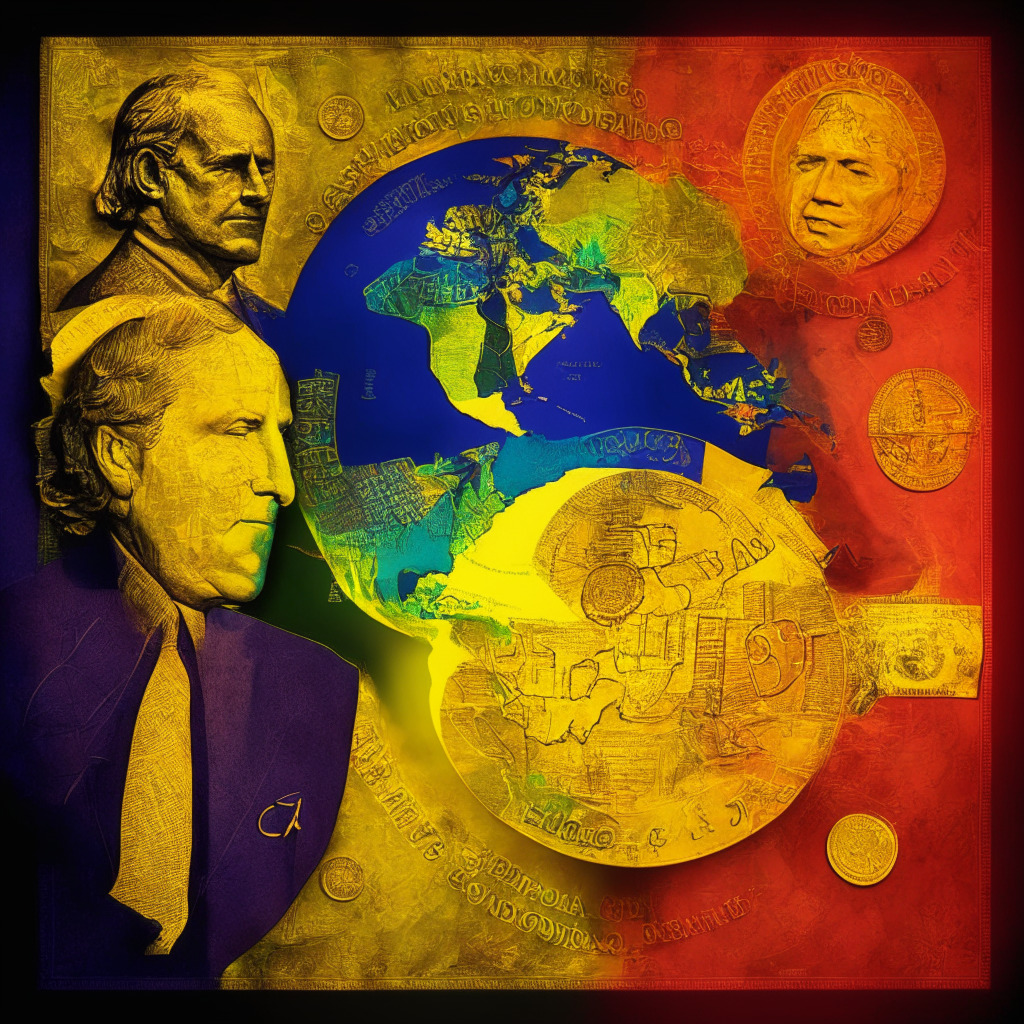The meteoric ascent of generative artificial intelligence has raised privacy and security concerns amid user-focused products like OpenAI’s ChatGPT. Governments and tech figures are sounding the alarm as AI threats to data privacy go beyond one model or developer.
Search Results for: Brazil
Bitkey Integration with Cashapp and Coinbase: Boon or Bane for Crypto Decentralization?
Jack Dorsey’s FinTech company, Block, plans to merge its self-custody bitcoin wallet, Bitkey, with Cashapp and Coinbase, enabling users to buy and sell bitcoin within the app. However, critics argue that this integration raises centralization and security concerns in an industry built on decentralization.
Belgian Fast Food Chain Embraces Crypto Payments: Innovative Adoption or Marketing Gimmick?
Belgian fast food chain Black & White Burger has partnered with French crypto app developer Lyzi, announcing that all 12 of its Belgian outlets will begin accepting crypto payments. The move makes the chain the first in Belgium to offer a service allowing customers to use 70 different tokens for payment.
De-Dollarization Wave: Pakistan’s Yuan-Based Oil Import and Global Implications
Pakistan’s recent oil import from Russia, using China’s Yuan, showcases the growing momentum towards de-dollarization and the exploration of alternative currencies, such as Bitcoin, in international trade. This shift may impact the US dollar’s dominance and global market stability, requiring careful risk assessment.
SEC Crackdown on Binance and Coinbase: Latin American Traders Flock to Bitget
The SEC crackdown on Binance and Coinbase led to a surge in new account registrations with Bitget, a popular Latin American crypto derivatives exchange. This highlights the crypto market’s adaptability and traders’ desire to find alternatives amid increased regulatory scrutiny.
Latam Crypto Migration: Bitget’s Surge Amid Binance & Coinbase Lawsuits – Exploring Alternatives
Latam crypto holders are increasingly turning to Bitget amid lawsuits against Binance and Coinbase by US regulators. This trend showcases the adaptability and resilience of the crypto market in changing regulatory landscapes, as enthusiasts explore alternative options in Latin America.
SEC Summer Crackdown on Binance & Coinbase: Legal Clarity or Market Fiasco?
The SEC has targeted Binance and Coinbase in its recent crypto crackdown, resulting in 13 charges against Binance and accusations of unregistered securities offerings against Coinbase. Despite ongoing uncertainty, these events may bring desired legal clarity to the industry.
Binance Pay & Credencial Payments Boost LATAM Crypto Accessibility: Pros, Cons & Conflict
The strategic partnership between Binance Pay and LATAM-based Credencial Payments aims to simplify and improve cryptocurrency payments in Latin America. This collaboration will enable effortless digital currency acceptance, real-time payments, and seamless local fiat conversions to strengthen the crypto adoption in the region.
Cryptocurrencies and Arab World: Saudi Arabia’s BRICS Bank Bid, Opportunities, and Challenges
Cryptocurrencies gain traction in the Arab world, with Saudi Arabia potentially joining the New Development Bank (NDB), opening new funding channels and fostering cryptocurrency adoption. However, geopolitical uncertainties and strategic regulations must be navigated to ensure sustainable success.
Bitcoin Breakout and Regulatory Clarity: Balancing Innovation, Growth, and Global Competition
Bitcoin’s recent breakout highlights the importance of regulatory clarity for its continued success. Strict US crypto regulations push innovation elsewhere, while countries like the UK, UAE, Brazil, Japan, EU, Australia, and Singapore establish their own cryptocurrency centers. Achieving regulatory clarity can support innovation, industry growth, and mitigate risks, maintaining the US as a global leader in cryptocurrency innovation.
Tether Leverages Uruguay’s Renewable Energy for Bitcoin Mining: Eco-Friendly Progress or Not Enough?
Tether expands into Bitcoin mining in Uruguay, leveraging the country’s 94% renewable energy sources. While reducing ecological footprint, it also raises environmental concerns and emphasizes the importance of balancing innovation with ecological impact.
Bank of Japan’s CBDC Pilot: Global Trends and Privacy Concerns Clash
The Bank of Japan’s CBDC initiative report reveals 11 countries have introduced a central bank digital currency, while 18 others are in the pilot stages. Amid growing global interest, concerns about privacy and regulatory challenges persist as nations explore CBDCs’ potential in the future of finance.
BRICS Nations Contemplating Alternative Trade Currency: Challenging the US Dollar’s Dominance
BRICS nations contemplate alternatives to reduce reliance on the faltering US dollar, with Brazil’s President Lula supporting a new currency for trade between BRICS countries. This challenges the US dollar’s dominance and could reshape the global financial order.
Ripple vs SEC: Lawsuit Impact on XRP Adoption and Ripple’s Future Prospects
The ongoing Ripple vs SEC lawsuit has significantly impacted Ripple’s business operations and XRP’s growth, particularly in the crucial US market. Regulatory uncertainty has deterred firms like Brazilian bank Rendimento from utilizing XRP, affecting its price despite Ripple’s partnerships. The lawsuit’s outcome may lead to increased XRP integration and offer brighter prospects for the company.
Coinbase’s Global Expansion: Can US Regulators Keep Up and Maintain Competitive Edge?
Coinbase navigates international expansion amidst US regulatory challenges, praising European Union and United Kingdom for their comprehensive approach to crypto regulation. Its aggressive global expansion highlights the need for US regulators to adopt a more proactive approach towards crypto regulation.
Bitfinex and OrionX Boost Crypto Adoption in Latin America: Opportunities and Risks Examined
Bitfinex partners with Chile’s leading cryptocurrency exchange, OrionX, to encourage widespread adoption in Latin America and support local education programs. With its growing significance, it’s crucial for Latin America to maintain financial stability and protect users amid expanding crypto market involvement.
El Salvador’s Bitcoin Blueprint: Visionary or Risky Path for Other Countries to Follow?
El Salvador’s Bitcoin strategy, designed to be easily replicated by other countries, could mark the beginning of the end for centralized banking systems, says Max Keiser, senior advisor to President Nayib Bukele. With failures in central banks worldwide, Keiser predicts a “super hyper Bitcoinization” phenomenon in response to “super hyper inflation,” urging countries to adopt Bitcoin or risk struggling in coming generations.
Bipartisan Battle Against CBDCs: Financial Privacy vs Global Adoption in 2023
US lawmakers introduced a bipartisan bill aimed at preventing the Federal Reserve from issuing a central bank digital currency (CBDC), citing concerns over financial privacy and surveillance. Despite opposition, global interest in CBDCs remains strong, with various countries planning pilot testing in 2023.
U.S. Crypto Regulation: Balancing Innovation and Public Safety to Ensure Global Leadership
The U.S. Chamber of Digital Commerce is urging Congress to prioritize a national approach to crypto regulation, warning that the lack of proper legal frameworks may result in the nation falling behind in the rapidly evolving blockchain space. Implementation of a unified strategy could bolster U.S. leadership, promote innovation, and address potential risks.
ChatGPT App Launch: A New Era in Mobile AI and Its Implications on Blockchain
OpenAI launches an official ChatGPT app for iOS, offering seamless user experience and enhanced accessibility to the popular chatbot. Android users can expect a launch soon. Privacy remains a priority, while comparisons between ChatGPT, Google’s Bard and Microsoft’s Bing highlight the varying capabilities of AI chatbots.
MicroStrategy’s BTC Wallet and Lightning Adoption: Game Changer or Overhyped Solution?
MicroStrategy plans to introduce a Bitcoin wallet and Lightning address for corporate account holders, aiming to facilitate efficient development and deployment of bitcoin rewards applications. The Lightning Network, seen as a game-changer, is expected to drive Bitcoin mainstream adoption. As more fintech firms embrace cryptocurrencies, MicroStrategy’s move could significantly upscale BTC adoption.
Crypto’s Hectic Week: Inflation Impact, Adoption Surge, and Regulatory Debate
This week, Tether reported $1.48 billion profit and increased crypto adoption by institutions like PayPal and Goldman Sachs. However, the Central Bank of Ireland Governor likened cryptocurrencies to a “Ponzi scheme.” US lawmakers are considering crypto regulations under SEC and CFTC supervision.
Tranglo and Ripple’s ODL Revolution: Milestones, Expansion, and Market Risks
Tranglo, a partner of Ripple, recently announced reaching over $1 billion in On-Demand Liquidity (ODL) transactions, after a successful partnership aimed at increasing customer demand in Asia and expanding ODL services. Ripple’s ODL service has gained recognition and adoption across various regions, revolutionizing cross-border transactions and indicating a promising future for both companies and the wider crypto community.
CBDCs on the Rise: Ripple’s Future Amid XRP Lawsuit and Crypto Whales Activity
Ripple’s report predicts significant growth for Central Bank Digital Currencies (CBDCs), potentially expanding from a $100 million market today to $213 billion by 2030. As Ripple advocates for CBDCs and expands globally, it faces an ongoing legal battle with the U.S. SEC, highlighting the uncertain regulatory landscape of the digital currency industry.
Blockchain Future: Exciting Prospects, Potential Pitfalls, and the Ongoing Debate
The recent disruptive blockchain event in New York highlighted the promising nature of blockchain technology, its prospects, and obstacles. Participants discussed opportunities brought about by the blockchain revolution, addressing skepticism about limitations, and emphasizing the potential benefits in various sectors such as supply chain management and financial services.
Latin American Common Currency: Boon or Bane for Regional Economic Stability?
The recent comments of Argentine Foreign Minister, Santiago Cafiero, on a Latin American common currency have stimulated discussion on its potential benefits and drawbacks. Despite possible advantages like reducing financial stress, regional currency integration is complex and requires careful consideration of political stability, economic policy alignment, and efficient governance structures.
Coinbase CEO’s Confidence in US Crypto Regulations Amid SEC Concerns
Coinbase CEO Brian Armstrong reassures investors of their commitment to the U.S. market despite regulatory uncertainty, expressing optimism about upcoming crypto legislation. However, he shares concerns about unpredictable enforcement action by the Securities Exchange Commission while highlighting progress in EU crypto regulation.
Iran’s Move to Join BRICS: Opportunities, Challenges, and Global Power Shift Dynamics
Iran’s move to join BRICS and create a multipolar world presents opportunities and challenges for global financial markets, digital currencies, and blockchain adoption. This shift signifies changing global power dynamics and pushes towards a more balanced and inclusive world order.
De-Dollarization’s Impact on US Banking Sector and Rise of Crypto Alternatives
IMF Managing Director, Kristalina Georgieva, highlights the growing trend of de-dollarization, increasing vulnerabilities in the U.S. banking sector, and the possible emergence of a new global currency. Crypto enthusiasts and industry professionals should closely monitor the shifting financial landscape and its potential global impacts.
Operation SpecTor Takedown: Balancing Privacy, Security & Blockchain’s Future
Europol’s Operation SpecTor dismantled Monopoly Market, arresting 288 individuals and seizing cash, crypto, and other illegal items. This highlights the dark web’s evolving landscape and raises questions about privacy, surveillance, and the appropriate use of blockchain technology within the crypto community.
Debt Default Fears & De-Dollarization: Russia’s Stance on the Shaky US Economy
Russia closely monitors the US economy amid debt default concerns and warnings by Treasury Secretary Janet Yellen. The ongoing crisis highlights economic system weaknesses, prompting countries like Russia to explore alternate solutions such as de-dollarization efforts and a potential common BRICS currency.
Global Multipolarity: The Inevitable Shift in Power Dynamics and Its Implications
Vladimir Putin discussed the trend of multipolarity, emphasizing its inevitability and warning against resistance to it. He stressed the importance of Russia strengthening relationships with friendly nations and fostering international collaboration, while acknowledging concerns of potential strategic rivalries and enabling undemocratic regimes in a multipolar world.































